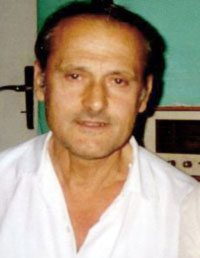Kasëm TREBESHINA

Among the little-known figures of the early years of postwar Albanian literature is Kasëm Trebeshina (b. 1926). Trebeshina was born in Berat and studied at the Shkolla Normale (Normal School) in Elbasan until joining the communist resistance movement in 1942. After the war he studied at the Ostrovsky Theatre Institute in Leningrad. A committed communist, but by no means a conformist, Trebeshina left the party and later the Writer's Union in Tirana. Much of his work was written in the late forties and early fifties, but never published.
In an extremely rare act of open dissent in Albanian intellectual life, Trebeshina tells us he sent a 'pro memoria' to Enver Hoxha on 5 October 1953, warning him that his cultural policies were leading the nation down the road to disaster. It goes without saying that the dictator was not particularly amused. Kasëm Trebeshina, the unpublished author of eighteen volumes of verse, forty-two plays, twenty-two novels and short stories, etc., vanished from the literary scene with scarcely a trace following this voluntary act of self-destruction. After seventeen years in prison, with interruptions, a comparatively light sentence as he later noted, and twenty years of silence, Trebeshina resurfaced with a handful of other writers, artists and intellectuals to see that his prediction had come true.
Of Trebeshina's voluminous writing, only one collection of poetry, Artani dhe Min'ja ose hijet e fundit të maleve, Tirana 1961 (Artani and Min'ja or the last mountain shadows), and an anonymous translation of the plays of García Lorca were published at the time. Three of his prose pieces were later edited by Ardian Klosi (b. 1957) in the volume Stina e stinëve, Prishtinë 1991 (The season of seasons), providing the reader with an initial glimpse into a fantasy world not unlike that of the tales of Mitrush Kuteli (1907-1967). The surrealist touch of what the author calls his ‘poetic realism’ is the result of his conscious revolt against the predominant current of socialist realism. Since the fall of the dictatorship, Trebeshina has published twelve volumes of writing, mostly short stories and drama.
|
![]()
BACK

